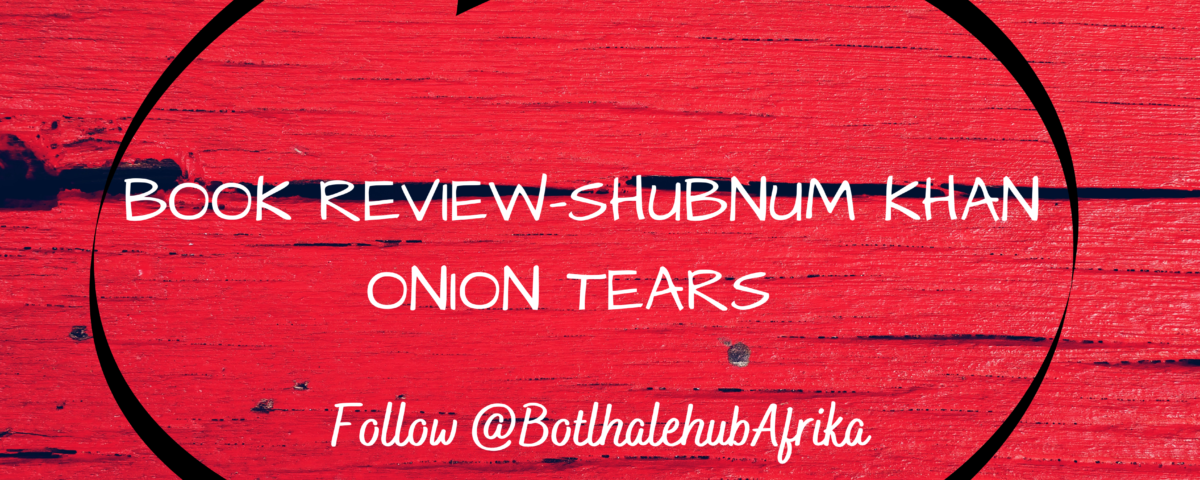Book review: Shubnum Khan Onion Tears

Sudan: We are not loud enough about the civil war in Sudan
November 20, 2024
Reflecting on the significance of the day of reconciliation in South Africa
December 17, 2024I was looking for a light read. Let me say, I just wanted to unwind and fiction was my best bet. On occasions where I purchase books, I usually have an idea which book I’m getting or let the books find me. However, this time around I consulted the deputy sales manager at the bookstore. She recommended Shubnum Khan, a Durban based author. I was immediately sold and purchased the book.
When it comes to reading books, I am very open-minded. Although I have a specific genre I love, I read across genres. I guess I can call myself a versatile-avid reader if those terms even exist. This particular book found me at the right time. It is very important for me to be ready when I read novels. I say this because on some occasions we miss the lesson shared by the books. I believe I needed these lessons.
‘’Onion Tears’’ is a very powerful and deafening title. A story of a first generation hard working Indian woman longing for her beloved homeland and questioning her place in Africa. Summaya, her daughter struggles to reconcile with her South African and Indian identities. Whilst Aneesa, Summaya’s daughter, had some difficult questions of her own. The three generations of women interwoven by love have secrets that need to come to the light. Yes, secrets have a way of coming out and I suggest that you purchase the book to find out.
My role as a book reviewer is to identify some of the life lessons from the book. I think it’s safe to say that there are two major learnings I took from Onion Tears.
Culture is universal across borders
Indian culture is very similar to most African cultures on the African continent. The nuclear family who aspire that their children become doctors or lawyers. The aunties in the family recommend suitors to marry their nieces or daughters. The grandparents inquiries of when to expect grandchildren. Then, there are the children raised in an evolving world expected to meet their parents’ expectations.
Not Summaya, she was defiant and sought what she loved, not what Khadeejah wanted for her. Her defiance was rooted in her upbringing and culture. On many occasions, I believe children just want to be accepted and embraced. As an evolving generation of young people we owe it to ourselves to allow children to be themselves. I think Khadeejah’s consciousness of the evolving world shifted a little when it came to her granddaughter. She was more progressive when it came to Aneesa. I believe this is because over time she herself had grown to silently interrogate her upbringing and culture. For her to later discover in her old age that she did not love her late husband.
Therefore, what I personally took from Khadeejah is that it is okay to interrogate your culture and upbringing. What is important is not to lose any of your principles. It is because principles are who you are and what you put out to the world.
Every family has a secret
It is not a myth, every family has a secret. It is universal. We just don’t like admitting the truth when it comes to having family secrets. Our elder generation has a very good record of keeping secrets and taking them to the grave. The part about secrets that we don’t discuss is how secrets make us bleed on people, foster a generation of silence and drive division in families. Families to date are not in contact or children question their identities because of the untold secrets. Summaya’s family because of secrets kept for years almost fell apart. I commend her for her accountability in the end. I also love the role Khadeejah played in standing by her daughter because secret or not her daughter needed her.
Lastly, I myself had a awakening because sometimes we tend to take the elder generation for granted. I mean it baffles me that Khadeejah had an exit strategy before losing her husband. She knew she deserved a better husband and would have left him had he still lived.
A beautifully written novel, I highly recommend.
Phiwe Mncwabe is storyteller, blogger and voice in Africa.
More stories-https://botlhaleafrika.co.za/
I am not affiliated to any political party. I am affiliated to the Africans.
The views that I share are mine and not affiliated to any employer. These views are not meant to bring harm.
Let’s talk about Africa. Which African country must I visit next?
Read Africa. Write about Africa. Put Africa first!
The hashtag to follow is #africabelongstoUS , #amplifyingvoices, #authenticstories
Note: Please click on our ads on our website.




